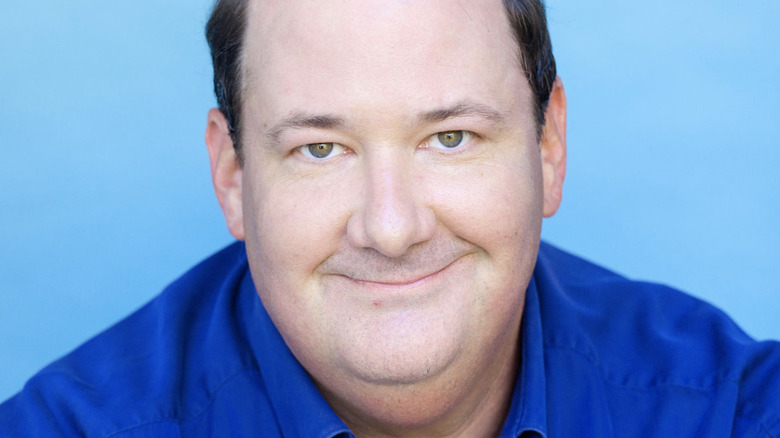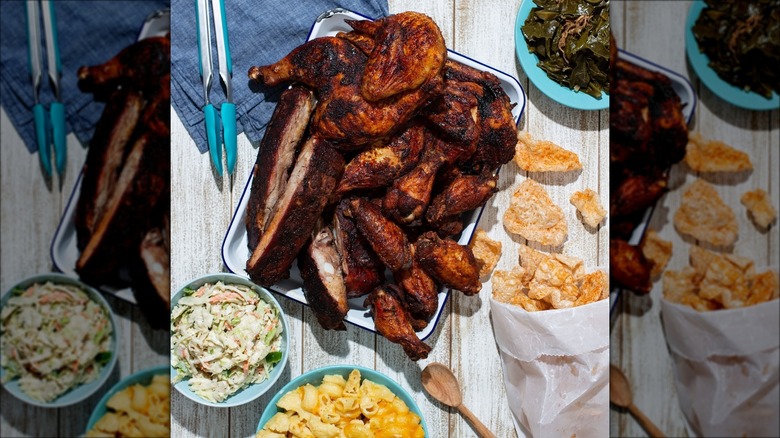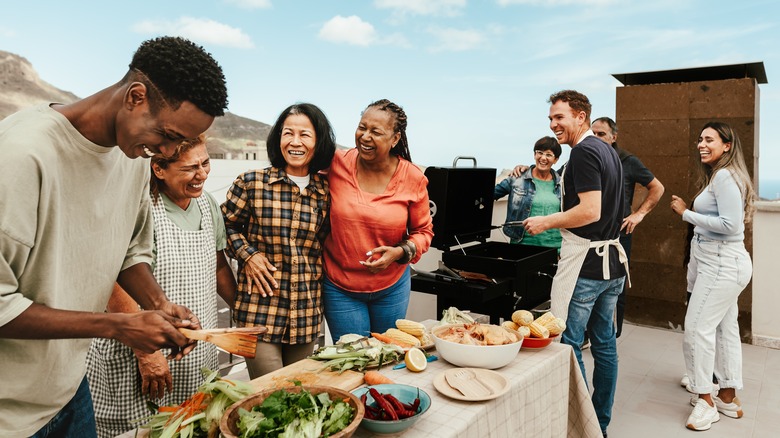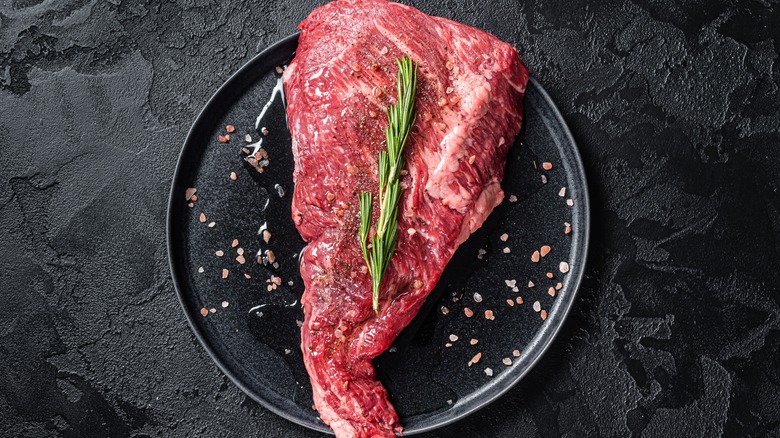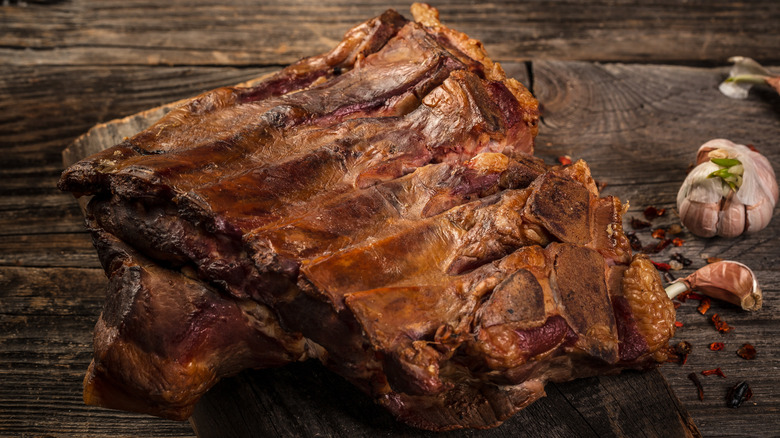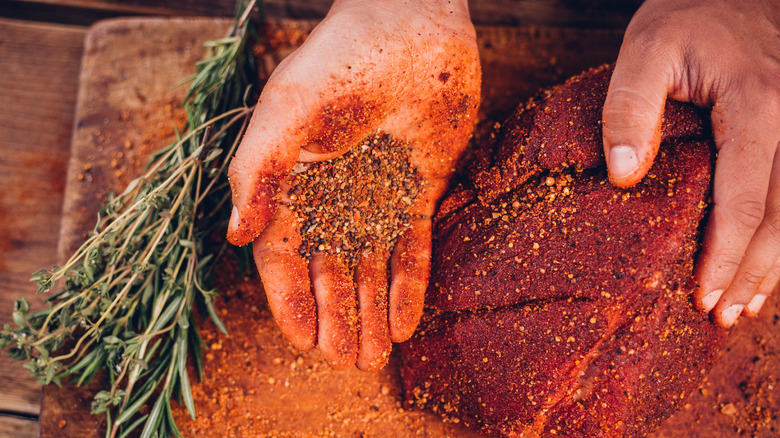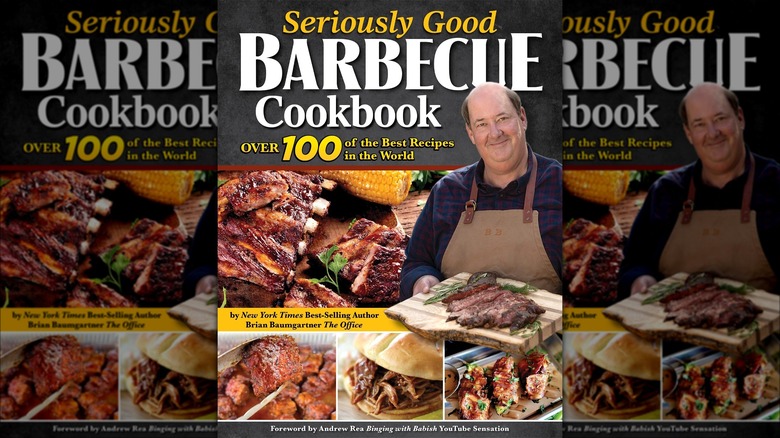The Office's Brian Baumgartner Wants You To Make The Best BBQ Of Your Life - Exclusive Interview
We may receive a commission on purchases made from links.
Brian Baumgartner is best known for his role as Kevin in the hit series "The Office." While it has been well documented that Baumgartner is nothing like the clumsy and oafish Kevin, the two do share one thing: a passion for good food. In addition to his acting career, Baumgartner has also published the hit cookbook "Seriously Good Chili," inspired in part by a gag from "The Office." Baumgartner spent years learning the history of chili and immersing himself in chili culture. Now he is back for a second serving with his new book "Seriously Good Barbecue."
"Seriously Good Barbecue" is a love letter to meats, smokes, and rubs. Baumgartner's new book details recipes from different areas and highlights the beauty of a type of cooking that brings people together. We got the chance to speak with Baumgartner in an exclusive interview about his new book. He shared the highlights of his cross-country barbecue journey and his tips for making the best barbecue.
Driving around the country in search of barbecue
You drove over 2,000 miles to visit your family, stopping at barbecue places along the way. What were some of your favorite barbecue places you stopped at?
So part of the inspiration for the book was, COVID hit, and I was, like everybody else who wasn't watching "The Office," just trying to find content online. And I came across this docuseries on Netflix, which was about barbecue masters around the world. It was a six-part series. And I, like a lot of people, was cooking. You had a lot of time, so spending time cooking was something that we did, or at least I did during the pandemic. And so I started making a lot more slow-cooked things over a barbecue, and I watched this series and I was fascinated. I thought it was great. And one of the subjects was Rodney Scott. Rodney Scott, does whole hog barbecue, and he has a joint in Charleston, South Carolina.
So I had not seen my parents in 9 or 10 months or something. And I was like, "I need to visit my parents." And I had a reason that I absolutely had to get on a plane and go to Nashville. So I drove from Nashville to Charleston, South Carolina, which is not close, with the end goal being to visit my parents. But I went out of my way because what else did I have to do? And I was by myself, and I went there to see what Rodney Scott was doing. And I was outside the restaurant. It was delicious, and there were guys outside who were roasting a pig out back and I was able to see that and talk to them about it, and just have this, I don't know, special solitary experience with these guys who clearly really knew what they were doing and were not just willing to talk about it, but had a desire to share what they were doing.
And to me, that's a lot of what barbecue is. It's like a communal experience that you share with your family and your friends and you're outside and having conversations like, "Why don't you try this," and, "Well, this is what I do." And it becomes very familial, even if it's not your family. And so this was the inspiration for me, for putting together these recipes that I had been taught and changed and developed, from some people whose food that I had tried and so many great chefs who were willing to share. I really wanted to put a collection together based on this experience ... I mean, Nashville and Charleston are not close. It's 8, 10 hours, something like that. So this was not a short drive, but it was this incredible experience that I had.
Rodney Scott's BBQ
When you went to Rodney Scott's place, was there anything in particular that you were just blown away by?
Well, for me, it was more how he was doing it and the process of that. I mean, it was delicious. It's pork, pork, and more pork, different kinds. Like I always say, it's about sharing. I mean, yesterday I made ribs and had some neighbors over and I was cooking it for a purpose, but I was like, "I've got a lot left over." We ended up having like 12 people over last night, trying and sharing different things and chicken and sides. But at Rodney Scott's, I was by myself, so I was like, "I know this is weird, but," it was one of those things where I'll have one of everything. I just wanted to try the pulled pork, the shoulder.
And so yeah, I mean, there's nothing specific that I remember, although Carolina has its own flavor profile, much more vinegar and mustard, much different than say what you would think of as traditional Texas barbecue, for example. I hadn't had a ton of that, even though I came from the South, and so that was very fun and different for me to try.
Why barbecue is more than just food
You brought up in your book and you were just mentioning that there's this big communal aspect to barbecue. What do you think it is about barbecue that brings people together?
Well, I think one is that barbecue by definition is a slow-cooked process, whereas grilling is more on the fire ... it just takes less time. So if you're doing something specifically on the barbecue, typically, you're doing a lot of it. So exactly what I had last night, I did some ribs. People don't really make ribs for one. It's too long, there's too much of it. So that's one reason, there's just typically a lot of food and things to try.
But I think also, it's one of those things, at least where I come from, I grew up in the South, and so there's very much a, "Well, this is how my mom did it," or, "My granddad used to do this." And talking about not just sauce and flavor profiles in that way, but actual, "This is the process that we used. You want high heat at the beginning and then turn it way down, or keep it at a steady temperature, or look at it or don't look at it." One of the things that I do that a bunch of people don't is, I like to keep it moist throughout. So some people put a drip pan in there with water in it. I like to get an old spray bottle and put apple cider in there. It's basting in this sweet flavor throughout, which, I don't know if it really makes it any moister, but that flavor of that apple cider gets into the meat and makes it end with a sweeter flavor.
So yeah, just little things like that. And yesterday, the conversation was like, "Oh, I've never seen that before." "Yeah, well, this is what I was taught." So yeah, that's I think a big part of it. I think it's the amount of food, one, and two, the willingness to listen to other people's takes and incorporate that. There are recipes, which this book has a lot of, but I think it's also much more about tips and tricks and advice. If you are looking, for example, for a sweeter flavor, you can use apple chips within the smoker, or you can use apple cider as a basting liquid as it's going. So everybody's got to come up with their own thing, and generally everybody has an opinion about how it should be done.
Picking the best meat
Yeah. So you have a whole section on different meats that you can barbecue. What is one of your favorite underrated cuts of meat?
Well, I think for a party, everybody knows filet mignon or prime rib are great, but to me, if you've got a really good marinade on a good high-quality tri-tip, there's almost nothing more delicious. I mean, it melts in your mouth. What I do is much more a combination of some high heat early on and then letting it finish in an indirect, slow-cooked way. I really enjoy a good tri-tip.
You also talk about the importance of finding high-quality meat.
Yes.
What factors do you look for when picking out a good piece of meat?
Where I grew up in Georgia, people say "Oh, well, get the meat," and then you pick that out in five seconds, and then you spend an hour and a half trying to either make or find the best sauce. And barbecue, I think, especially in big-chain restaurants, it's about the sauce. And it's like whatever's underneath it is much more irrelevant. People are just really doing themselves a disservice. I mean, if you live in a place where you know where the meat came from, you can get locally sourced meat from local farms, or at least farms that you know that have responsibly raised animals, that makes such a huge difference. One, I think it's the right thing to do, but two, in terms of the taste of what you're eating and the consistency of what you're eating, it makes the biggest difference in the world.
And a lot of times, I think people, when they think they're eating, "less expensive cuts of meat," say, they don't think about the quality of the meat as much, but it makes an enormous difference. So myself, for example, I don't buy meats at the grocery store. I don't know where that came from or how long it's been there, or how those animals were raised and all of that. I want to know that. And ultimately, as I said, it's the right and responsible thing to do, but if for some reason you're not concerned about that, it also just makes things taste way, way better.
Tips for people who are new to barbecue
One of the things I love about this book is that it's very approachable for people who are new to barbecuing.
Good.
Do you have any tips for someone who is new to barbecue, other than buying the book, obviously?
Well, thank you for that. I'm not going to say the trick is to undercook the onions. I'm not going to say that. Well, what I just talked about was one, buy good meat. I promise you it makes a difference. So that's one. I mean, for example, you talk about ribs, there should be a lot of meat on baby back ribs. And unfortunately, oftentimes, you go to an unnamed grocery store and you buy ribs and there's nothing there. And of course, if there's nothing there, that's not going to taste very good.
That's number one. Two, don't be intimidated. Because I think that's a large thing as well, that with slow-cooked things, people are insecure in what they're doing, and so they try to speed something up. If you get the book and you follow the recipe and the amount of time it takes, trust the process, I guess. And most likely, if you follow it closely, it's going to be delicious. And you're also probably going to figure out something new each time, like I did yesterday. I've done it a lot where I was like, "You know what? Next time, I'm going to do this." It will help a lot.
That's what I would say. Buy good meat, one, and two, trust the process. And actually, then I'll say three, which I've also said, but it's not about the sauce, guys. It's not about the sauce, it's about the meat.
Is there any particular recipe you feel someone should start with?
Well, I mean if you want to go low and slow, I think that my baby back rib recipe in there is very achievable. And again, if you trust the process, there's not a ton of steps. You don't have to get lost. You think about a lot of great French recipes or something, where there's so many steps and you're having to do things and accomplish things very quickly in a particular order, that gets intimidating. I think barbecue intimidates people because it takes so long, and they think they're messing something up. But I think there are relatively few steps in that baby back rib recipe. But if you follow the instructions and you trust the time, you're going to end up with something that you can be proud of and that everybody's going to love. And you'll become the rib guy, I promise.
Barbecue essentials
What ingredients do you think are essential to have on hand for barbecue?
I mean, if you're talking barbecue, you're talking about low and slow. You can experiment with [the sauces]. they're all probably going to be pretty decent, or at least you'll be able to identify which ones are pretty decent. A good barbecue rub is important. And that's not a joke. Rub liberally. Put the rub on, don't douse it with sauce, because those herbs and spices are going to give it so much flavor. And you're not going to have to kill it with sauce in the end. So yeah, if you're going low and slow, I think that's great. The other thing you need is very good high-quality long tongs. That's very, very, very important. And also a good salt and pepper shaker. A good salt and pepper shaker and something that you can use as you're grilling as well to continue to season, I think that's really important.
Was there any surprising technique or ingredient you discovered while compiling this book?
Any surprising tips or ingredients? No, but I will tell you this. I think that if there is something that I'm most proud of, and if there's something that you can get from me that I feel like over time will be the most valuable — we cook a lot of chicken. A lot of chicken. And I feel like I have come up with a technique and a marinade that makes boneless, skinless chicken breasts continue to be moist and not dry, which, as you and probably everybody knows, is a very difficult thing to do. So I think a lot of people cook chicken and chicken breasts and then they don't want to grill it because they're afraid it's going to be hard and dry. So that's a technique of mine that I'm tremendously proud of, and I hope people find as much success with it as I have.
What's the technique called?
My Technique.
Excellent.
I don't know, The Brian Technique. It's essentially about using a combination of direct and indirect heat, that will give the chicken a nice browning, but you don't keep it over direct heat because it ends up killing the ... I mean, not killing the chicken, but it ends up making the chicken very dry, I feel like, when you do that. So that's the Brian technique. There you go.
Baumgartner's favorite recipe from the book
Do you have a favorite recipe from the book?
Oh man, there's so many. I have a friend who, I actually approached him and was like, "We have to have this recipe in the book." I'm not looking at the book right now, so I'm being a naughty, naughty author, but it's San Francisco Korean Inspired Ribs, or something like that. The chef is John Mardikian, and he's a friend, but his story is also amazing. He's a chef because his grandfather was a chef. His grandfather was George Mardikian, and George Mardikian was an Armenian chef in San Francisco, who ended up being an advisor to President Eisenhower when he was head of the Allied forces in World War II to help advise him that giving proper food with nutrition and not, for lack of a better word, slop, was actually going to give soldiers more energy and help them as they were fighting World War II. And he continued a relationship with George Mardikian when he became president, and my friend's grandfather would visit Eisenhower at the White House.
And so one, it's a really cool story, and two, every time we go to their house, I'm like, "You're going to make the rib thing, right?" It is served in a bao bun and it's just spectacular.
Oh, that sounds amazing. And one of the things I also appreciate about the book is it includes different styles of barbecue, and it even has some vegetarian recipes in it, which I found surprising, because you don't typically think of barbecue and vegetarian together. What was the thought process behind that?
I would say that for me, there's one definition of barbecue, which is slow-cooked meats. But for me, as I talked about before, it's about an experience as well. So that is why we wanted to show different regions and what influences came from different regions. We also wanted to include sides, and some vegetable sides, because I mean, ultimately, it's meant to be enjoyed, and for me, meant to be enjoyed with a lot of people. And so keeping it just strictly meats, and even quite frankly, just strictly slow-cooked meats, was limiting in a way. So my definition of barbecue is more about having a barbecue gathering. And so we wanted to make it one, accessible, and two, give a lot of options for people, regardless of who they were having over and what they wanted to make.
And I have to ask, for grilling, are you team gas or charcoal?
I'm team gas mostly, on a night-to-night basis, it's obviously way easier and faster. And if you're cooking for one or two or a small family, I cook primarily on gas, but for low and slow, I want a smoker. I want charcoal.
"Seriously Good Barbecue" by Brian Baumgartner will be released June 11th and is available for preorder now.
